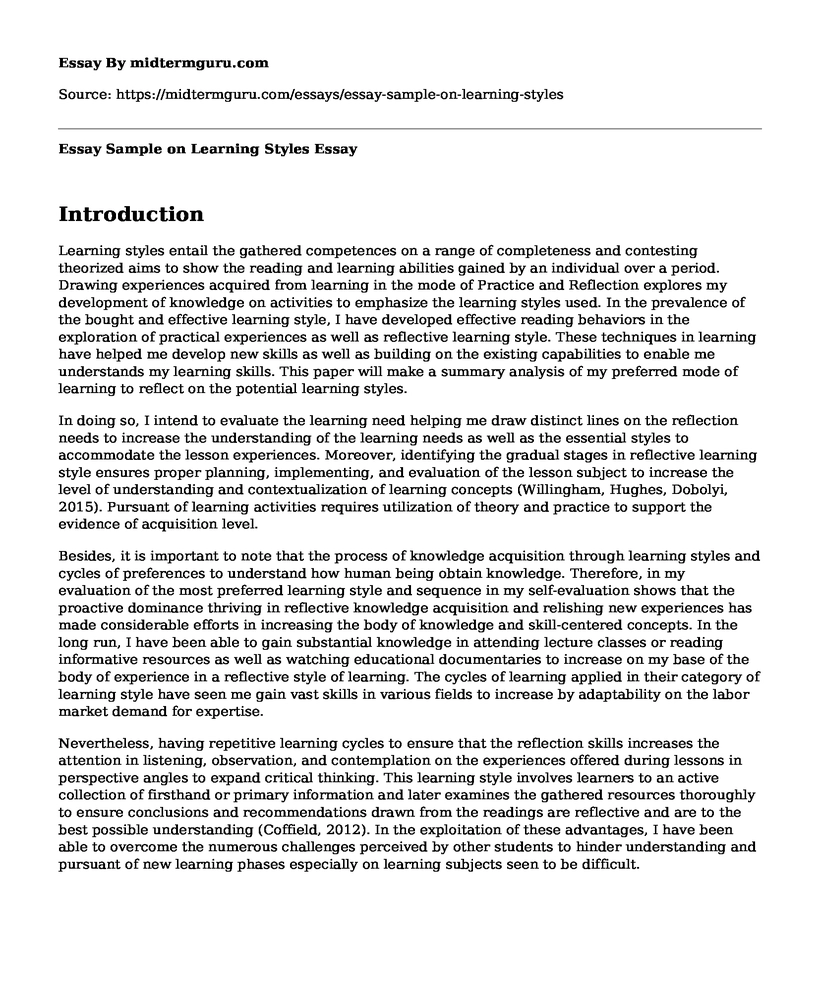Introduction
Learning styles entail the gathered competences on a range of completeness and contesting theorized aims to show the reading and learning abilities gained by an individual over a period. Drawing experiences acquired from learning in the mode of Practice and Reflection explores my development of knowledge on activities to emphasize the learning styles used. In the prevalence of the bought and effective learning style, I have developed effective reading behaviors in the exploration of practical experiences as well as reflective learning style. These techniques in learning have helped me develop new skills as well as building on the existing capabilities to enable me understands my learning skills. This paper will make a summary analysis of my preferred mode of learning to reflect on the potential learning styles.
In doing so, I intend to evaluate the learning need helping me draw distinct lines on the reflection needs to increase the understanding of the learning needs as well as the essential styles to accommodate the lesson experiences. Moreover, identifying the gradual stages in reflective learning style ensures proper planning, implementing, and evaluation of the lesson subject to increase the level of understanding and contextualization of learning concepts (Willingham, Hughes, Dobolyi, 2015). Pursuant of learning activities requires utilization of theory and practice to support the evidence of acquisition level.
Besides, it is important to note that the process of knowledge acquisition through learning styles and cycles of preferences to understand how human being obtain knowledge. Therefore, in my evaluation of the most preferred learning style and sequence in my self-evaluation shows that the proactive dominance thriving in reflective knowledge acquisition and relishing new experiences has made considerable efforts in increasing the body of knowledge and skill-centered concepts. In the long run, I have been able to gain substantial knowledge in attending lecture classes or reading informative resources as well as watching educational documentaries to increase on my base of the body of experience in a reflective style of learning. The cycles of learning applied in their category of learning style have seen me gain vast skills in various fields to increase by adaptability on the labor market demand for expertise.
Nevertheless, having repetitive learning cycles to ensure that the reflection skills increases the attention in listening, observation, and contemplation on the experiences offered during lessons in perspective angles to expand critical thinking. This learning style involves learners to an active collection of firsthand or primary information and later examines the gathered resources thoroughly to ensure conclusions and recommendations drawn from the readings are reflective and are to the best possible understanding (Coffield, 2012). In the exploitation of these advantages, I have been able to overcome the numerous challenges perceived by other students to hinder understanding and pursuant of new learning phases especially on learning subjects seen to be difficult.
Conclusion
As a result, exploitation of the principles of reflective learning style, I can get comfortable with a learning exercise only when am fully aware of the necessary concepts. Thus, I postpone the results for the learning cycle until the preferred desire is achieved. Therefore I engage into active discussion forums with other learners, or engage with a lecturer to the unruffled aura and enhance tolerance in increasing my reader-ability standard. Conclusively, learning styles requires student's identification the cycle of learning they engage in to improve their contextual understanding of the concepts. Although reflective learning style does not go in handy for rushed learning cycles, it has given me a tremendous advantage in understanding difficult subjects because of the internalization elements it offers in learning.
References
Coffield, Frank (2012). "Learning styles: unreliable, invalid and impractical and yet still widely used". In Adey, Philip; Dillon, Justin. Bad education: debunking myths in education. Maidenhead, UK; New York: Open University Press. pp. 215-230. ISBN 9780335246014.
Willingham, Daniel T.; Hughes, Elizabeth M.; Dobolyi, David G. (July 2015). "The scientific status of learning styles theories". The teaching of Psychology. 42 (3): 266-271. doi:10.1177/0098628315589505.
Cite this page
Essay Sample on Learning Styles. (2022, Sep 07). Retrieved from https://midtermguru.com/essays/essay-sample-on-learning-styles
If you are the original author of this essay and no longer wish to have it published on the midtermguru.com website, please click below to request its removal:
- Relationship Between English Language and Spanish Language - Paper Example
- Special Teaching in Higher Education - Paper Example
- Exams as a Measure of Students Abilities - Education Essay Example
- The Directed Reading-Thinking Activity - Paper Example
- Conduct of Children: Birth Order & Social Influence in Schools - Research Paper
- Teachers: Inspiring Creativity & Right Choices for a Better Future - Essay Sample
- Canada's Residential Schools: Abuse, Trauma & Harsh Consequences - Essay Sample







